Peace Through Strength
Reagan National Defense Survey
Overview
The Reagan National Defense Survey is a public opinion poll that assists elected officials, policymakers, and key stakeholders with understanding how Americans view a wide array of defense, foreign policy, and national security matters.
Explore The Surveys

2025 Reagan National Defense Survey
Nearly nine in ten say it is important for the United States to have the strongest military in the world, and Americans back concrete steps to deter aggression: investing in technologies like the Golden Dome, strengthening alliances, supporting Ukraine, and preparing to defend Taiwan.
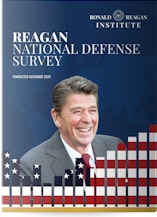
2024 Reagan National Defense Survey
We released the seventh annual Reagan National Defense Survey, showing Americans believe the United States must lead on the world stage, backed by a strong U.S. military.
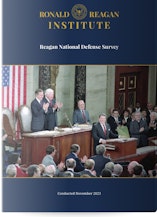
2023 Reagan National Defense Survey
This year's survey reveals concerns that congressional budget cuts will lead to reduced military capabilities and support for increasing military spending on cutting-edge technologies like artificial intelligence.
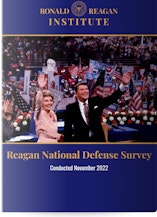
2022 Reagan National Defense Survey
In the face of geopolitical events that shook the foundations of global peace and security in 2022, Americans see U.S. leadership as the key to restoring the peace.
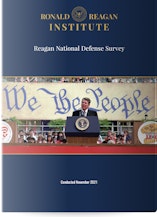
2021 Reagan National Defense Survey
Despite uncertainty among the American people about whether or how the United States should lead in the world, there is a significant bipartisan consensus that China is the greatest threat we face.
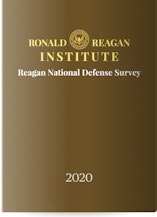
2020 Reagan National Defense Survey
The latest Reagan National Defense Survey reflects a downturn in overall attitudes across nearly every category of question. One of the more alarming downward trends is declining trust and confidence in the military.
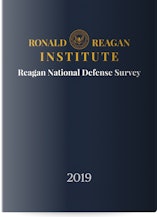
2019 Reagan National Defense Survey
Americans remain steadfast in their support for a strong military that both keeps the peace and advances the values of freedom and democracy abroad. Americans are not isolationists. They want America to be more engaged in the world, not less.
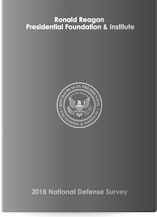
2018 Reagan National Defense Survey
Americans remain steadfast in their support for a strong military that both keeps the peace and advances the values of freedom and democracy abroad. Americans are not isolationists.

About The Survey
The Reagan National Defense Survey is a national public opinion poll that measures how the American people understand key defense and national security issues. Since 2018, this survey has offered policy makers and opinion leaders insight into the views of the American people.
Unique among opinion surveys, the Reagan National Defense Survey is entirely devoted to these issues, offering uncommon depth on topics ranging from global threats and force sizing to alliance commitments and emerging technologies. Since many questions have been asked consistently for eight years, the survey provides valuable trend data that shows how attitudes are changing or remaining consistent. This continuity makes it a trusted barometer of public views on American leadership, peace through strength, and the challenges posed by authoritarian adversaries, as well as support for allies defending freedom. Its findings inform discussions at the Reagan National Defense Forum and other Reagan Institute initiatives, ensuring leaders across government, industry, and academia see and use this data.